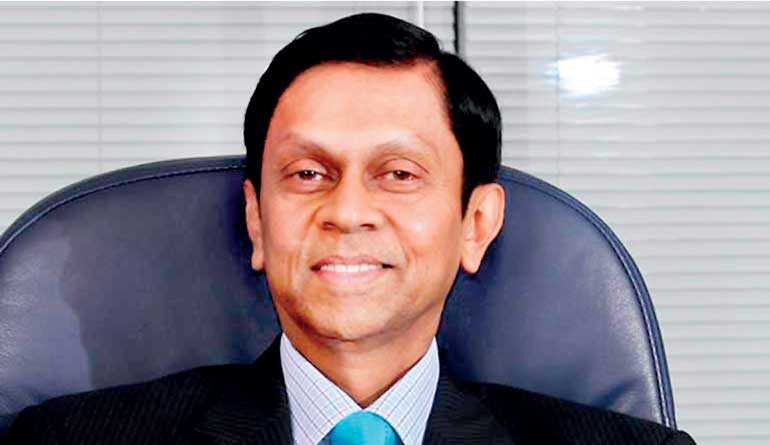Thursday Feb 26, 2026
Thursday Feb 26, 2026
Wednesday, 23 October 2019 01:58 - - {{hitsCtrl.values.hits}}

Ajith Nivard Cabraal
Ajith Nivard Cabraal has proposed a twelve-point methodology to boost the economy of Sri Lanka. It is pertinent to examine carefully the proposals of a person who is inclined to be a Finance Minister of a future government.

Sri Lankan economy is in dire straits. Income of the state has been lessor than the expenditure from the date of independence except for few years. The deficit was covered by domestic and foreign borrowings. As a result of the prolonged deficits of the Government budget, Government debt increased gradually. If these expenses were used at the optimum level, then there would have been an economic growth which would have facilitated the repayment of debts.
For instance, expenditure on education would have created an educated young generation which would have been capable of enhancing the national production. Eventually it would support the growth of the economy. When the economy is growing income of the Government also will grow with increased income from taxes and thereby the debts can be settled. In other words, there is no harm of borrowing if the benefits are more than the expenses incurred.
When this Government came to power, on one hand Government debt was going up and on the other hand Government revenue was going down. In 1990 Government revenue as a percentage of Gross Domestic Production (GDP) was 19.6%. In 2014 it dropped to 11.5%. In 2018 it marginally increased to 13.3%. Government debt as a percentage of GDP was 71.3% in 2014 and in 2018 it was 82.9%. Government debt is comprising of foreign debt and domestic debt. This increase was due to the increase of foreign debt.
In 2014 the component of foreign debt to GDP was 30% and in 2018 it was 41.6%. The reasons for this increase were foreign borrowing to bridge the budget deficit, low growth of GDP, and depreciation of the rupee during the tenure of this Government. Decrease of the growth of GDP started in 2013, during the tenure of the previous Government which was 3.4%. Average GDP growth from 2010 to 2012 was 8.5%. Average growth rate from 2013 to 2017 was 4.2% and in 2018 it was 3.2%. IMF predicted that the growth in 2019 would be 2.7%.
Although this Government as well as the previous Government declared that the budget deficit would be reduced, it has not reduced to the expected level. Ruling parties give relief to the people in the years of the elections and as a result budget deficit increases in those years.
In addition to the budget deficit there is a deficit between the receipts of exports and the payments to imports. A considerable amount of this deficit is covered by the foreign remittances received from the people employed overseas. Exports should have been increased in order to bridge this deficit. In 2004 income received from the export of goods and services as a percentage of GDP was 35.3% and in 2010 it was reduced to 19.55%. In 2014 it was 21.09% and in 2018 it was marginally increased to 22.7%. Therefore, the economic prosperity during the previous Government which is highlighted very often was a myth. Prosperity was there superficially but erosion was started underneath.
Cabraal’s twelve points should be viewed in this background. His first suggestion was to immediately slash tax rates by at least 20% while also abolishing several obnoxious taxes which have seriously affected business sentiment and confidence. By reducing taxes the rich will be encouraged to invest. As a result there can be an economic growth. This is an accepted phenomenon. During the economic slowdown of the previous years, many suggested that the economy can be stimulated by reducing taxes and increasing the Government expenditure. This was tried by the present Government as well in their first budget prior to the general election.
This Government is trying to find out lasting solutions to the two basic questions of the country, budget deficit and the trade deficit. Although the movement is slow the selected path is correct. In the run economic growth is affected. There are no quick solutions to the chronic economic problems. The duty of the next Government should be to expedite the slow movement and not to mess it up by going in a different direction
With the increasing growth of the GDP there is an increasing chance of paying the debt. Since the Government revenue has reduced drastically this Government had to increase taxes in order to rectify the situation. Not only that, out of the total tax revenue, 80% comes from indirect taxes and only 20% comes from direct taxes which means those who can pay, pay less compared to those who cannot pay. Moreover, the expected income from Value Added tax is also not received. This situation is obnoxious in the point of view of the state.
During the previous regimes various tax concessions were given to the private sector and it is doubtful whether the state got the return expected. Although it may have been unpopular at this crucial point and detrimental to the re-election of the Government, it was mandatory to take certain steps to increase the revenue of the Government.
Therefore, all these things should be balanced. If there are any obnoxious taxes those should be removed. Discussions should be carried out with the private sector who pays the taxes.
He went on to suggest that the interest rates should be reduced. This is being done now. He wanted to stabilise the exchange rate by instilling confidence among key investors and gradually steer the Sri Lanka Rupee to a value of around Rs. 150 per USD by end 2021. He further stated that such gradual strengthening of the rupee will be based on the improvement of the business environment which will then allow all stakeholders to gradually adjust to the strengthening currency.
During the tenure of the previous Government the value of the rupee was kept at artificially inflated value. The main reason for this decision was that if the rupee was devalued the Government would have to pay more in terms of the rupee for the foreign currency borrowings. In two instances Central Bank could not hold it and there were rapid depreciations of the rupee. However, the main victims of this policy were the exporters. Consequences were visible and during that period exports reduced drastically.
There is no proposal to improve the exports among these proposals and this proposal discourages exports. For Sri Lanka there is no other way for solid development other than export of goods and services by linking to high-end production and service channels since we are having a small domestic market. Policy should be to focus on the exports and if the exports improve, rupee will be eventually strengthened. Rupee cannot be strengthened by mere improvement of the business environment. There are no short cuts in this process and jargons of words would not serve any purpose.
During the previous regime GSP+ relief to export the goods to European Union with concessionary customs duty was withheld. At that time the Government did not agree to grant certain human rights of the people as a condition of that relief. As a result, the exporters who exported goods to European Union were affected. This Government obtained this relief back.
He wanted to renegotiate all unfavourable commercial agreements that have been entered into or to be entered into by the current Government including the Hambantota Port, Mattala Airport, and Millennium Challenge Agreement. This is a good move. As a result of a similar negotiation by this Government, we were able to convert an unfavourable agreement with China to hand over them a portion of the reclaimed land under the Port City project to a 99-year lease agreement.
His next major suggestion was to build 600 km ellipsical ring expressway around the entire island and to initiate several other mega infrastructure development projects in order to give a significant boost to the real economy at the ground level. Duty of the Government is to invest in infrastructure. This will result in the promotion of investments. It is also true that mega investments would be a stimulation to the ailing economy. It would be beneficial if low interest loan can be obtained for a long period. It would be hard to get low interest loans since we are a middle-income country.
Politicians like this type of mega projects. Stimulation will be sustainable only if the production and exports follow. These mega projects should not be white elephants such as Mattala airport.
Based on the situation of the country it is the responsibility of the innovative rulers to find out the ways to get more benefits by investing a lessor amount. A considerable amount can be saved by reorganisation of the public sector. Ranil Wickremesinghe, when he became the Prime Minister in 2001 at the time the economy recorded a negative growth, stopped the recruitments to the public sector altogether. As an experienced politician he would have known that it was a political suicide, but he did it since it was essential at that time due to inflated public sector.
Cabraal’s short-term proposals such as to call for a moratorium on capital repayment by customers who service their interest payments without interruption, for a period of 18 months; Government to establish a Business Revival Fund to provide relief to the financial institutions to face the rapidly increasing NPL scenario; and stabilise all financial and banking institutions immediately and wherever necessary, provide liquidity support; were good proposals.
In order to come out from the present situation effectively the budget deficit should be reduced. Small and medium entrepreneurs living throughout the island should be supported effectively. Production and the exports should grow. Tax concessions and low interest loans should be given to the exporters. Then the trade deficit would be favourable and the economy would be expanded. More importantly the country should have the rule of law. This is of paramount importance for the foreign investors to come.
This Government is trying to find out lasting solutions to the two basic questions of the country, budget deficit and the trade deficit. Although the movement is slow the selected path is correct. In the run economic growth is affected. There are no quick solutions to the chronic economic problems. The duty of the next Government should be to expedite the slow movement and not to mess it up by going in a different direction.
The political movement represented by Cabraal promotes authoritarianism and chauvinism. The political movement represented by the present Government promotes democracy. Both political movements promote market-based economy. Based on the accepted political thinking the first movement represents the far right. In addition to that there is another left-wing political movement represented by JVP. People’s preference will be given in next month.